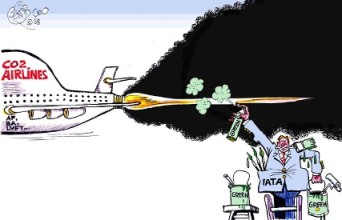Aviation and biofuels lobbyists amongst 'EU's worst'
 Greenwashing lobbyists in the aviation and biofuels industry are some of this year’s nominees for the Worst EU Lobbying Awards.The International Air Transport Association (IATA) and agrofuel lobbyists from the Malaysian Palm Oil Council, Brazilian sugar partnership UNICA and Abengoa Bioenergy have been nominated as candidates for the Worst EU Lobbying Awards, an annual spoof award ceremony organised in Brussels by campaign groups Corporate Europe Observatory, Friends of the Earth Europe, LobbyControl and Spinwatch.
Greenwashing lobbyists in the aviation and biofuels industry are some of this year’s nominees for the Worst EU Lobbying Awards.The International Air Transport Association (IATA) and agrofuel lobbyists from the Malaysian Palm Oil Council, Brazilian sugar partnership UNICA and Abengoa Bioenergy have been nominated as candidates for the Worst EU Lobbying Awards, an annual spoof award ceremony organised in Brussels by campaign groups Corporate Europe Observatory, Friends of the Earth Europe, LobbyControl and Spinwatch.According to the campaigners, IATA runs a “deceptive lobbying campaign to avoid CO2 reduction obligations in the aviation sector”. They cite a ‘greenwashing’ website set up in partnership with IATA, and claim that IATA is actively lobbying Australia and other governments to take legal action against the EU for including aviation in its regional emissions trading scheme.
In July 2008 MEPs voted for emissions cuts by airlines of 3-5% from 2012 onwards, providing 85% of the industry’s pollution permits for free.
Biofuel agro
The agrofuels lobby was bashed for falsely advertising within EU media that expansion of agrofuels based on palm oil and sugarcane would not affect food security or lead to deforestation.
An advertisement, produced by the MPOC and shown on BBC World, was ruled “misleading” by the British Advertising Standards Authority, in January this year, because it portrayed palm oil plantations as beneficial for the environment.
Abengoa has made false media claims about research that shows the EU can sustainably grow enough agrofuels to meet demand without needing imports, according to the Awards organisers. The research Abengoa quoted was commissioned by their own industry, say the campaigners, while independent research from the European Environment Agency shows different results.
EU green lobbyists: ‘worst culprits’
Last year’s award winner was the German car lobby, criticised for using “manipulative tactics” when campaigning against EU mandatory emissions targets for passenger cars.
“Environmental lobbying is a particular concern in the EU” says Erik Wesselius, a campaigner at Corporate Europe Observatory. One of the main problems with lobbying transparency in the EU is the lack of a mandatory declaration of funding sources, according to Wesselius. A voluntary database was set up last year for lobbyists to register their commercial interests, and currently has 446 registered lobbyists, including NGOs.
Wesselius claims that the PR industry has retaliated against the worst lobby awards this year by setting up its own awards ceremony in order to polish up its image. The worst lobbying awards, which are now in their fourth year, will this year be preceded by the European Public Affairs Directory Awards 2008 - due to be held on 5 November 2008 in Brussels.
The Worst EU Lobbying Awards voting booth will remain open until 30 November. The winners will be announced at a ceremony in Brussels on Tuesday 9th December.
You can return to the main Market News page, or press the Back button on your browser.

